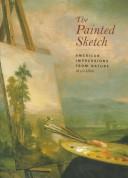| Listing 1 - 3 of 3 |
Sort by
|
Book
ISBN: 1885440375 Year: 1998 Publisher: Cobb, Calif. : First Glance Books,
Abstract | Keywords | Export | Availability | Bookmark
 Loading...
Loading...Choose an application
- Reference Manager
- EndNote
- RefWorks (Direct export to RefWorks)

ISBN: 0810963647 0936227249 Year: 1998 Publisher: New York Dallas Abrams Dallas Museum of Art
Abstract | Keywords | Export | Availability | Bookmark
 Loading...
Loading...Choose an application
- Reference Manager
- EndNote
- RefWorks (Direct export to RefWorks)
Artists' preparatory studies --- Landscape painting, American --- Etudes préparatoires d'artistes --- Peinture de paysages américaine --- Exhibitions --- Expositions --- Etudes préparatoires d'artistes --- Peinture de paysages américaine --- Landscape painting [American ] --- Landscape painting --- 19th century --- United States --- Oil sketches

ISBN: 058517783X 0520919777 9780520919778 9780585177830 0520210549 0520210557 Year: 1998 Publisher: Berkeley University of California Press
Abstract | Keywords | Export | Availability | Bookmark
 Loading...
Loading...Choose an application
- Reference Manager
- EndNote
- RefWorks (Direct export to RefWorks)
Six plein-air painters in Oakland, California, joined together in 1917 to form an association that lasted nearly fifteen years. The Society of Six--Selden Connor Gile, Maurice Logan, William H. Clapp, August F. Gay, Bernard von Eichman, and Louis Siegriest--created a color-centered modernist idiom that shocked establishment tastes but remains the most advanced painting of its era in Northern California. Nancy Boas's well-informed and sumptuously illustrated chronicle recognizes the importance of these six painters in the history of American Post-Impressionism. The Six found themselves in the position of an avant garde not because they set out to reject conventionality, but because they aspired to create their own indigenous modernism. While the artists were considered outsiders in their time, their work is now recognized as part of the vital and enduring lineage of American art. Depression hardship ended the Six's ascendancy, but their painterliness, use of color, and deep alliance with the land and the light became a beacon for postwar Northern California modern painters such as Richard Diebenkorn and Wayne Thiebaud. Combining biography and critical analysis, Nancy Boas offers a fitting tribute to the lives and exhilarating painting of the Society of Six.
Landscape painting, American --- Color in art --- Painting --- Visual Arts --- Art, Architecture & Applied Arts --- Colors in art --- Art --- Monochrome art --- American landscape painting --- Society of Six. --- Color in art.
| Listing 1 - 3 of 3 |
Sort by
|

 Search
Search Feedback
Feedback About UniCat
About UniCat  Help
Help News
News